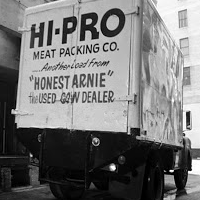Record Slaughterhouse Abuse Settlement, while States Try to Stop Investigations
 Scene from the movie “Seconds”
Scene from the movie “Seconds”
A final settlement last week of the largest meat recall in the nation’s history assessed the largest monetary judgment ($155 million) ever entered in an animal abuse case. But the consent judgment will not be paid, because the responsible parties don’t have that kind of money, even as some state legislatures move to prevent these kinds of legal actions entirely.
The California slaughterhouse and meatpacking companies that supplied beef to the National School Lunch Program and others will pay $3.1 million to settle allegations arising from the release of disturbing videos in February 2008 by the Humane Society of the United States. The videos, shot by an undercover investigator, showed inhumane handling of cattle and lackluster inspections of downer cattle at a Westland Meat and Hallmark Meat Packing operation in Chino.
Images of sick cows being kicked, prodded with electric shocks and hauled around with forklifts prompted the recall of 143 million pounds of beef. About a fourth of that was in the school lunch program.
The U.S. Department of Justice joined a lawsuit with the Humane Society and in the process of investigation threw in charges that a convicted felon, Aaron "Arnie" Magidow, was illegally involved in the operation. The late Magidow’s indiscretions included lying to a federal inspector. Two of his companies, M&M Management and Cattlemen's Choice, provided loans to the companies.
Although the final judgment against Westland Meat Packing will be entered as $155 million (down from the original $497 million deal), the company lacks the assets to pay it and the government agreed to accept a much lower figure. The company and its owner, Steve Mendell, will pay $240,000. The widow of Magidow and inheritor of his estate agreed to pay $2.45 million. She is not considered a responsible party.
Donald Hallmark Sr. and Donald Hallmark Jr., settled in October 2012 for $304,130. The Humane Society was awarded $600,000 under the False Claims Act for its whistleblower participation.
None of the defendants continue to provide meat to the school lunch program.
In response to the abuse videos and ensuing legal action—not to mention a century of exposé and scandal—lawmakers across the country sprang into action.
The bills they introduced were innovative and often drafted by the American Legislative Exchange Council (ALEC), a conservative organization known for promoting pro-corporate legislation. The proposed legislation made it more difficult for animal rights activists to investigate slaughterhouses and meat processing plants.
Utah is one of a half-dozen states that have adopted an ag-gag law, along with Kansas, Iowa, Montana, North Dakota and Missouri. About two dozen other states have rejected similar measures in the past two years. The Utah law, which is being challenged in court, criminalizes placing a recording device at an agricultural operation; lying to get on the premises; making a recording after faking one’s way into an operation; and recording while trespassing.
Bills in Nebraska, Tennessee and California have focused on making it illegal to withhold information from law enforcement for more that a few days after its collection. Indiana, Arkansas and Pennsylvania considered making it illegal to film videos of agricultural operations.
California’s Assembly Bill 343, authored by Fresno Republican Jim Patterson, died without a hearing in April. It would have put a 120-hour limit on turning over evidence and expressly forbid the use of video “inadvertently captured” by a company’s own surveillance cameras.
–Ken Broder
To Learn More:
School Lunch Suppliers Settle Cow-Abuse Claims (by Barbara Leonard, Courthouse News Service)
Settlement Reached in California Beef Recall Case (by Gillian Flaccus, Associated Press)
Meatpacking Firms Reach Settlement on Animal Cruelty Charges (by James Barragan, Los Angles Times)
Former Suppliers of Beef to National School Lunch Program Settle Allegations of Improper Practices and Mistreating Cows (U.S. Department of Justice)
Owners of Infamous Calif. Slaughterhouse Pay Millions to Settle Government Fraud Case (The Humane Society of the United States)
Utah Argues Plaintiffs Have No Standing to Challenge State’s New ‘Ag-Gag’ Law (by Dan Flynn, Food Safety News)
Animal Rights Groups Sue Utah over Law Criminalizing Undercover Photography of Farm Abuse (by Matt Bewig, AllGov)
$497 Million Slaughterhouse Fine Is Biggest Ever for Animal Abuse, but Won’t be Collected (by Ken Broder, AllGov California)
- Top Stories
- Controversies
- Where is the Money Going?
- California and the Nation
- Appointments and Resignations
- Unusual News
- Latest News
- California Forbids U.S. Immigration Agents from Pretending to be Police
- California Lawmakers Urged to Strip “Self-Dealing” Tax Board of Its Duties
- Big Oil’s Grip on California
- Santa Cruz Police See Homeland Security Betrayal in Use of Gang Roundup as Cover for Immigration Raid
- Oil Companies Face Deadline to Stop Polluting California Groundwater





